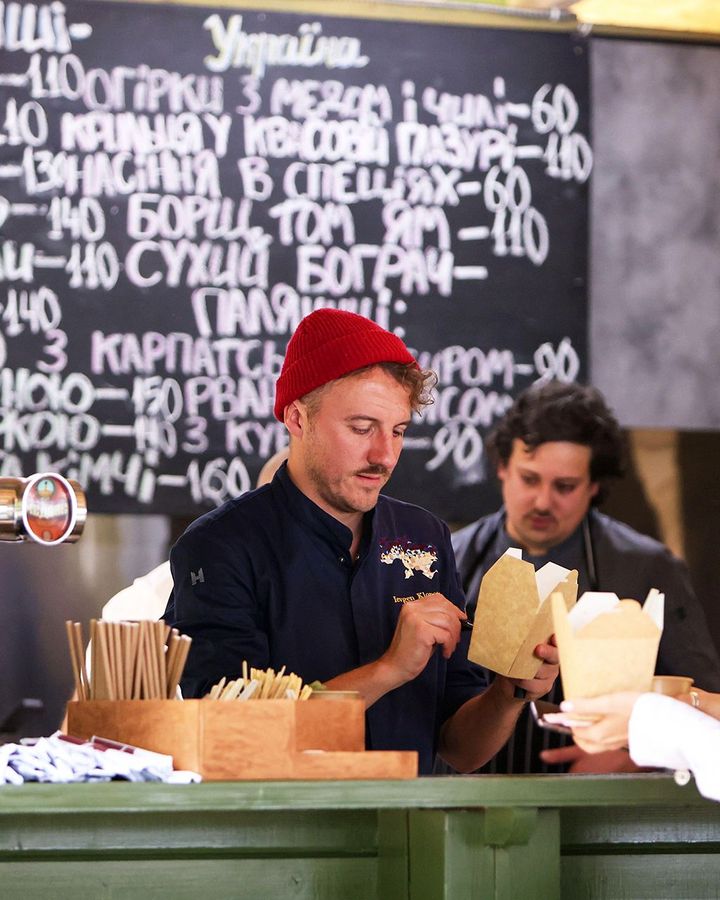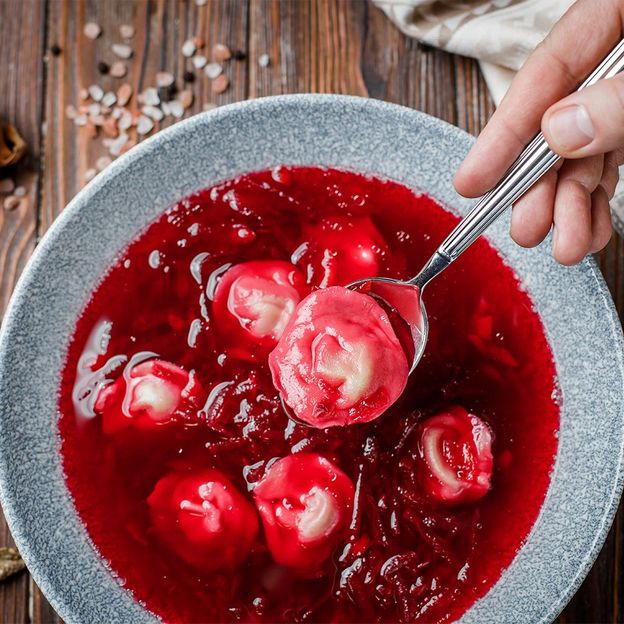Vegetarian borsch with vushka (dumplings) - bbc.com
Cooks and wait staff were criss-crossing behind chef Ievgen Klopotenko at his award-winning 100 Rokiv Tomu Vpered restaurant in Kyiv when he launched into a poetic discussion about borsch. It's a category of food unto itself, he exclaimed; it's the feeling of a mother hugging their child, it's the backbone of Ukrainian strength and culinary identity.
The chef paused every now and again to answer a question or give instructions in Ukrainian. Then he was back at it, proclaiming his love for all things borsch and Ukraine.
Foreign media have referred to Klopotenko as the Jamie Oliver of Ukraine or even as the country's most famous chef. Such praise would once have seemed unlikely. Klopotenko said that he was just cooking eggs "and nothing special" when he was 18. He didn't grow up cooking or learning from his parents or grandparents. Rather, Klopotenko describes himself as "a chef inspired by the internet" because it was a video of Gordon Ramsay that motivated him to follow this path.
The internet opened him up to the broader culinary world. All he knew at the time were foods of the former Soviet Union. But online, he could suddenly find videos on how to cook steak, pasta and many other dishes.
"I saw that in the world exists different ingredients and products," he said. "That's why I started to cook."
Klopotenko and his business partner, Inna Popereshniuk, opened 100 Rokiv Tomu Vpered in March 2019. It was Popereshniuk who called him around 04:00 on 24 February 2022 to let him know that the Russian military had begun their invasion. He said he spent the first week with his parents just outside Kyiv before going to Lviv in western Ukraine for about two months. While there, he opened another restaurant, Inshi bistro, where he started feeding refugees free of charge. Meanwhile, 100 Rokiv Tomu Vpered only closed for two days. On 26 February, it re-opened to serve food for the army, territory defence and people in bomb shelters.
Borsch, a culinary symbol of Ukrainian identity, was among the dishes served. You'd think a Ukrainian chef might get tired talking about borsch, but Klopotenko welcomes the opportunity.
"It's like a song," he smiled, before transitioning into a swift rendition of Haddaway's What Is Love (Baby Don't Hurt Me). "Borsch is pure love."
For Klopotenko, borsch transcends soup. He stressed the cultural importance of the dish. Borsch is a surname, the name of different cities and it plays prominently in different Ukrainian proverbs. "Each family has their unique recipe, so [borsch] is our symbol of Ukraine. It's very important for our culture."
Like most Ukrainians, Klopotenko grew up eating borsch. His mother made it two different ways: mild; and acidic with beans. The sour version was always his father's favourite. But no matter where he went – to school, visiting friends or to different villages – the borsch was always different.
The conversation quickly shifted into the ongoing Russian war in Ukraine. It's a natural transition because borsch has long been a cultural sticking point between the two countries.
Klopotenko believes Russia has unjustifiably tried to lay claim to borsch. Although neighbouring countries do have their own spins on a beetroot soup, he insists that borsch is 100% Ukrainian.

(Credit: Raj Valley/Alamy)
"It was first mentioned in 1548 in the diary of a German traveller who tasted the soup in a market near Kyiv," he said. "But like many aspects of Ukrainian culture, it was absorbed and appropriated by the Soviet Union."
Klopotenko compares borsch with pizza. You can eat pizza in the US or China, but its roots are still deeply Italian. The same goes for borsch.
"Borsch is one of our symbols that they wanted to take from us," he said. "I'm not on the front line, I'm on the food line. That's why I have to fight here."
That's why he turned to Unesco. As he saw it, they were an authoritative, international body that could back up Ukraine's cultural connection to borsch. Klopotenko and his supporters gathered 700 pages of documents and sent them over to the organisation. In July 2022, the culture of Ukrainian borsch cooking was inscribed into Unesco's List of Intangible Cultural Heritage in Need of Urgent Safeguarding.
"Ukrainian borsch […] is an integral part of Ukrainian family and community life," reads the decision, noting that the vote was fast-tracked given the ongoing war and "its negative impact on this tradition".
In lieu of visiting Ukraine, Klopotenko says there's no better way to understand Ukrainians and their strength than by cooking borsch. And while meat features prominently in many borsch recipes, Klopotenko points out that the dish started out vegetarian. Potatoes and tomatoes entered the equation following European colonisation of the Americas. Meat still didn't come until later on.
"We started to add meat only like 150 years ago," he said. "Before that, it was just the beetroot and the vegetables you could find in the garden."
Klopotenko emphasises that there is no exact recipe for the dish. But for his vegetarian borsch, he starts with preparing the stock with celery root, onions and carrots.
"You boil it for 40 minutes," he explained. "And that gives you a nice base for the borsch. It's like the first layer."
The second layer brings "the intensity" of the beetroot, and Klopotenko advises using as much as you can. It doesn't matter if it's fresh, grated or baked, he said, and a little beetroot juice won't hurt either if you have it on hand.
For the third layer, you can add whatever local vegetables you have. Klopotenko said Ukrainians in the west will use mushrooms from the mountains. But he imagines that home cooks in London might turn to cabbage instead.
The final layer adds smokiness. The most popular method to achieve this a century ago was cooking the borsh in a wood-fired oven for about an hour. Now, people add a couple of tablespoons of smoked paprika. But another trick that Klopotenko said they'll do in Ukraine is adding a wood-smoked pear. This, he said, gives off a nice woody aroma.
Klopotenko also gives instructions for adding mushroom-stuffed vushka (dumplings) to the borsch, a vegetarian alternative to the more traditional pork ribs. For serving, you can adjust the acidity of the borsch by adding a little sour cream or yoghurt.

Ievgen Klopotenko's vegetarian borsch with vushka (Credit: klopotenko.com)
Vegetarian borsch with vushka (dumplings)
By Ievgen Klopotenko
(serves 6)
Time: 2 hours 50 minutes
Ingredients
For borsch broth
2 beetroots
150g red beans
3 litres, plus 150ml water
½ cabbage, quartered
1 carrot, washed and unpeeled
2 onions, halved
¼ celery root, peeled
2 tbsp oil
1 sweet red pepper, peeled
10 sprigs of parsley
3 bay leaves
5 dried allspice berries
½ tsp salt, plus extra to taste
1 lemon
1 tsp sugar
For vushka dough
300g flour
150ml water
⅔ tsp salt
2 tbsp oil, plus extra for sprinkling
For vushka stuffing
3 potatoes
1 onion
200g champignons or oyster mushrooms
100g white mushrooms (fresh or frozen)
50g dried white mushrooms
2 tbsp oil
Method
Step 1
Soak the dried white mushrooms water for at least 30 minutes. Wash 2 beetroots, put them in a saucepan and fill with water. When the water boils, simmer the beetroots for one hour. Set aside.
Step 2
Pour 150ml of cold water in a saucepan with the red beans. Cook them for 1 to 1.5 hours. Set aside.
Step 3
In a saucepan with 3 litres of water, add cabbage, carrot, onion, celery root, sweet red pepper, parsley, allspice, bay leaves and salt to taste. Cook for 30 minutes on medium heat.
Step 4
Meanwhile, make the dough for the vushka. Mix 300g of flour, 150ml of water, 2 tbsp of oil and 2/3 tsp salt in a bowl. Knead dough until elastic. Cover and set aside for now.
Step 5
For the vushka stuffing, peel three potatoes and cut into medium pieces. Put them in a saucepan, fill with salted water and boil for about 25 minutes. When the potatoes are ready, mash them.
Step 6
Peel and dice an onion. Chop 200g of champignons or oyster mushrooms, 100g of fresh or frozen white mushrooms and 50g of soaked dried white mushrooms into small pieces.
Step 7
Heat 2 tbsp of oil in a frying pan, then add the onions and mushrooms, spreading them out. Add a little salt and fry until the moisture evaporates from the mushrooms.
Step 8
Combine mashed potatoes with fried mushrooms in a bowl. The stuffing for the vushka is ready.
Step 9
Sprinkle a little flour on the work surface and roll out the vushka dough in a thin layer. Form circles approximately 9.5cm in diameter (approximately the same as a drinking glass) out of the dough. Spread the potato and mushroom fillings onto the dough circles and fold the dough in half, encasing the filling, and pinch to close to form into vushka.
Step 10
Bring salted water to a boil in a saucepan and cook the vushka for three minutes. Place the prepared vushka in a bowl and sprinkle a little with oil.
Step 11
Peel and grate the two boiled beetroots and sprinkle with lemon juice, 1 tsp sugar and ½ tsp salt. Leave for one hour to marinate.
Step 12
Take all the vegetables out of the stock. Discard everything except for the carrots, then grate the carrots on a large grater. Add grated beets, carrots and boiled beans to the vegetable stock. Cook everything together for 10 minutes.
Step 13
To serve, put five to six vushka in a bowl and fill with prepared borsch broth.
BBC.com's World's Table "smashes the kitchen ceiling" by changing the way the world thinks about food, through the past, present and future.
---
Join more than three million BBC Travel fans by liking us on Facebook, or follow us on Twitter and Instagram.
If you liked this story, sign up for the weekly bbc.com features newsletter called "The Essential List". A handpicked selection of stories from BBC Future, Culture, Worklife and Travel, delivered to your inbox every Friday.
from "food recipes" - Google News https://ift.tt/IvcKZxn
via IFTTT
Comments
Post a Comment